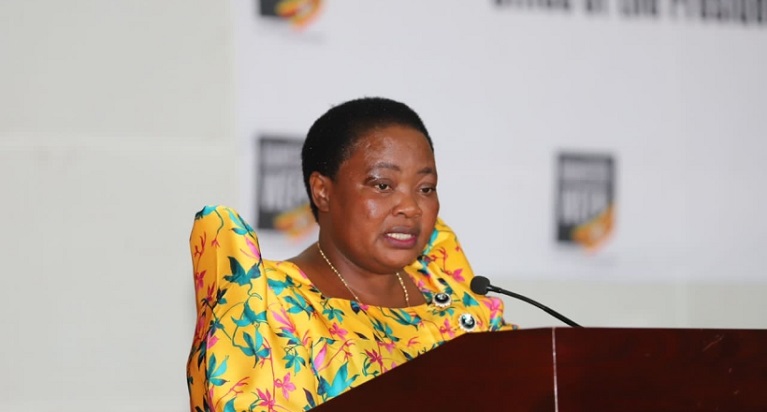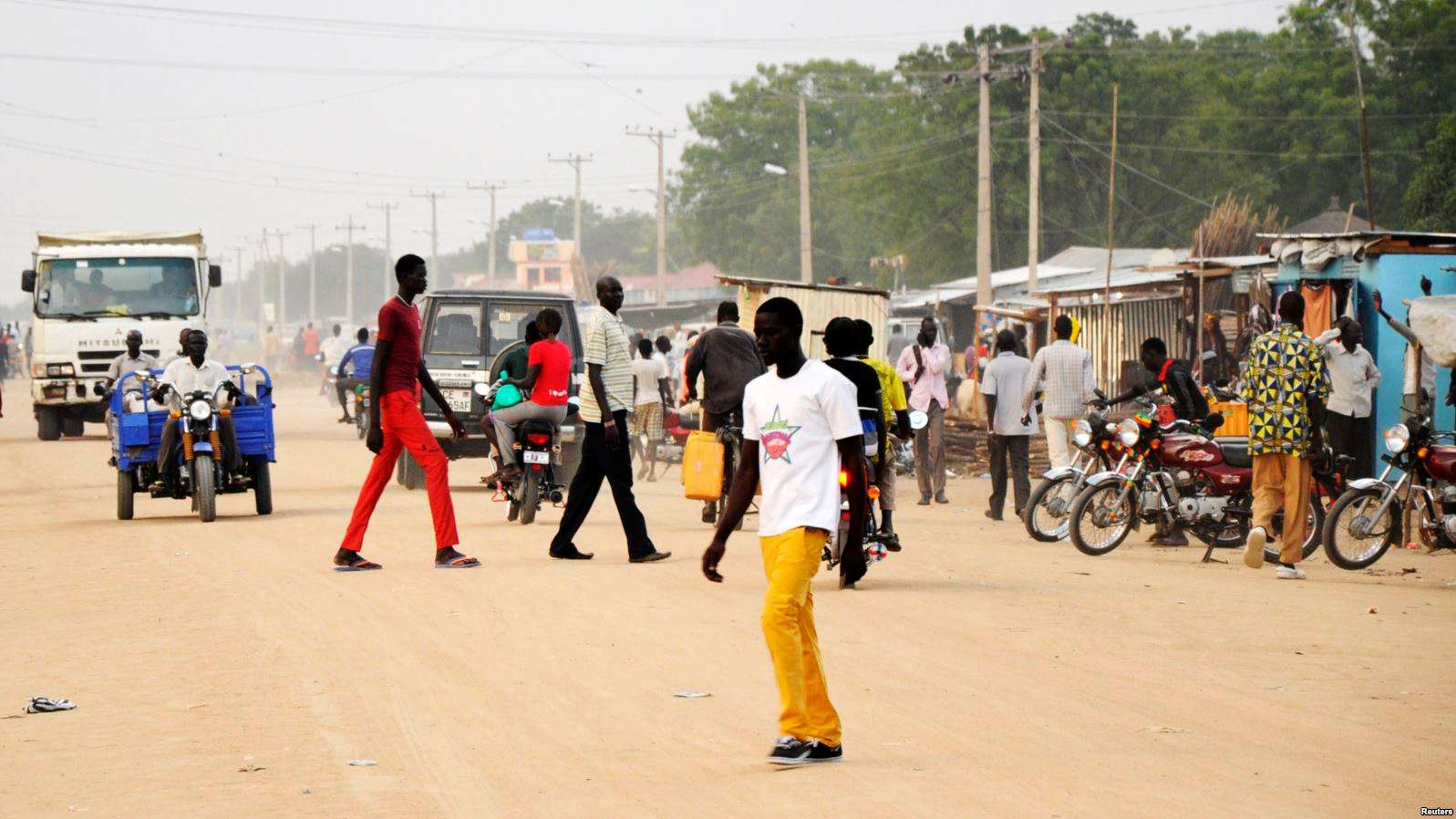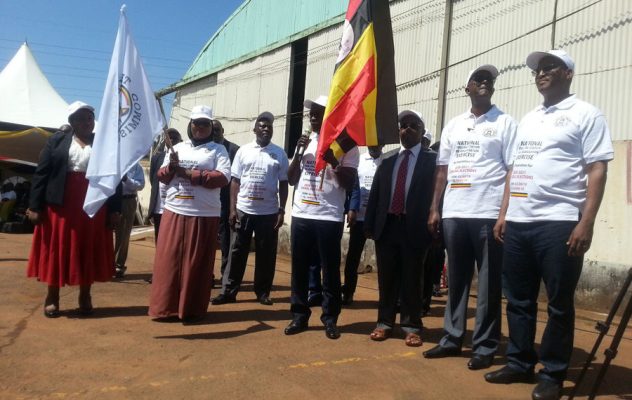Prime Minister, Robinah Nabbanja
The National Resistance Movement (NRM) government has achieved 35% of the 2021-2026 Manifesto commitment, while 49% of the commitments are on track to be achieved, the mid-term report indicates.
The revelation was made by Prime Minister, Robinah Nabbanja on Friday in a speech delivered by Miily Babirye Babalanda, the Minister for the Presidency while presiding over the launch of the Manifesto Week in Kampala.
“I am happy to inform you that at Mid-Term (that is after two years and half) the NRM government has been has been able to achieve 35% of the commitments, while 49% of the commitments are on track to be achieved. In simple terms if we attain the required resources as planned, Government can easily realize an 84% achievement of the Manifesto commitments at the end of the implementation period,” said Nabbanja in a speech delivered by Babalanda.
The NRM Government begun this political term in 2021 having won the general elections based on the aspirations that were made through the Manifesto 2021-2026. The Manifesto was aligned to the National Development Plan III and has guided Government service delivery since then.
The 2021-2026 Manifesto is under the theme of “Securing your future”.
Through the stewardship of President Yoweri Museveni, Nabbanja says that the NRM Government has implemented the Manifesto commitments in line with the core principles of; Democracy, Pan-Africanism, Socio-Economic Transformation and Patriotism.
A Mid-Term Review of this Manifesto was undertaken from March to August 2024 and a report was generated. This Mid-Term Review report was considered and passed by Cabinet on November 4, 2024.
Job creation
According to Nabbanja, the direct employment opportunities registered during this implementation period are 1,259,275 jobs computed from the Manufacturing, Services, Emyooga, Tourism, Judiciary, Energy Sector and Presidential initiative on skilling. Cumulatively, she added that the list of formal jobs has grown to 3.14 million while informal jobs created by Emyooga, Youth Livelihood Programme, PDM and Women Entrepreneurship Programme, are over 4.66 million.
Parish Development Model (PDM)
For the Financial Year 2023/2024, Shs 1.0594 trillion was appropriated to capitalize the 10,594 PDM savings and co-operative societies (SACCOs) countrywide. As at June 10, 2024, data from the PDM Secretariat indicates that 10,585 verified PDM SACCOs have been fully capitalized with over Shs. 200 million each (out of the 10,594 SACCOs budgeted for), thus operationalizing the Parish Revolving Fund with Shs. 100 million per Financial Year.
Over 1,195,718 beneficiaries in 1,405,222 Households across the country had received the Parish Revolving Fund (PRF) and invested in various production enterprises as prescribed by the PDM guidelines.
Agriculture
Nabbanja says that the agriculture sector grew by 5.1 percent contributing 24.6 percent to total GDP.
“In absolute terms the GDP of the agriculture sector increased from UGX 39.1 trillion in the FY 2021/22 to UGX 43.9 trillion in the FY 2022/23. Within the agriculture sector, increased food and cash crop production, livestock, fish volumes and improved agricultural support services contributed much of this growth. Further, the sector performance witnessed improved quantity of coffee, dairy, fish and tea produced in the country in FY 2023/24,” said Nabbanja.
According to Nabbanja, the volume of coffee produced currently stands at 7.8 million (60 kg bags) an increase from 6.95 million (60 Kg bags) in 2018/19. The value of coffee exports earnings has also steadily increased from US$416.19M in 2018/19 and now stands at USD 1.14bn (UCDA, 2024). Nabbanja says that the government has installed 16,600 small scale irrigation schemes to various farmers across the country.
“The area under formal irrigation has now expanded to 22,976 hectares in FY 2022/2023, a significant increase from 22,504 hectares recorded in 2020/2021,” says Nabbanja.
Markets
Government has so far constructed and completed 12 Markets which are now operational. These markets are; Kabale Central Market, Mbarara Central Market, Kasese Central Market, Arua Main Market, Moroto Market, Soroti Main Market, Tororo Central Market, Busia Main Market, Lugazi Central Market, Masaka Central Market, Kitoro Central Market, Kitgum Central Market. The number of vendor capacity is 17,399 spread across all the various markets.
“The markets today employ approximately 70,000 Ugandans directly and indirectly and have induced about 28,000 new businesses (shops and restaurants),” Nabbanja revealed.
Rural Transformation Funds
To enhance social inclusion, Nabbanja says that the government has implemented the Emyooga Fund, Women Entrepreneurs fund, Social Assistance Grant for Empowerment (SAGE), National Special Grant for PWDs (NSG-PWDs) and Special Enterprise Grant for Older Persons (SEGOP). Cumulatively, over Shs. 480bn has been released under Emyooga to 7,049 SACCOs; under SEGOP, 307 Older Persons Group Enterprises have been funded to the tune of Ugx 5.55Bn and this directly benefited 1,874 older persons. Under UWEP, a total of Ushs35.94Bn Women Enterprise Fund has been disbursed to 5,109 women groups covering 42,647 beneficiaries. The National Special Grant for PWDs has received 42.1bn.
Energy
Electricity Connectivity currently stands at 60% for both on-grid and off-grid connections, with on-grid connections reaching 22% as of December 2023. Approximately 2,300,000 household connections have been established. For the first time in the history of Uganda, Nabbanja says that West Nile sub region has been connected to the National Grid.
The two sub stations (Nebbi and Arua) were officially commissioned on August 3, 2024, Nabbanja said.
In regard to extending power to Sub-county headquarters, the Prime Minister said 1,770 out of 2,075 Sub-county Headquarters have been connected.
Transport Infrastructure
Nabbanja said that a total number of 6,529km of National road projects have been undertaken.
| Status | KM |
| Those completed are; | 543 |
| Those ongoing are; | 561 |
| The signed commercial contracts are; | 422 |
| Those under procurement are; | 348 |
| Designs completed & Awaiting allocation of Funds are; | 472 |
| The ongoing designs are; | 1,008 |
| The projects in the pipeline (To be considered when funds are available) | 3,175 |
| Total | 6,529 |
In an effort to improve maintenance of District roads, Nabbanja said an allocation of an extra Shs 1bn to each district for FY 2023/24 was provided and maintained for FY 2024/25. In regard to bridges, 28 bridges across the country have been constructed.
Nabbanja notes that the government of procured a New EPC/T Contractor M/s Yapi Merkezi from Turkey.
“Acquisition of Right of Way for Malaba to Kampala is ongoing. Out of the approved Resettlement Action Plan (RAP) reports, UGX 151.65Bn has been paid to 5,023 Project Affected Persons (PAPs) as at April 2024 acquiring 1,522.44 acres,” said Nabbanja.
ICT
According to Nabbanja, currently the country has got a 66.44% internet penetration as of 2023 up from 25.03% in 2016 while the tele-density is at 72% (2022) up from 61.2% in 2016. “The number of national telecom operators is 3, Mobile Cellular Geographic signal coverage stands at 89% of the country and a population coverage of 72% for basic voice communications. A total of 4,353.87 km of Fiber Optic cable have been laid across 57 Districts of Uganda; Internet subscription grew from 8.04m in 2016 to 23.77m in 2022. The price of the internet has reduced from USD 205 in FY 2021/22 to USD 35 and USD 70 for the MDAs and the public respectively in FY 2023/24,” noted Nabbanja.
Education
On the Manifesto commitment to have a secondary school in each and every sub county, Nabbanja said that the government has completed the construction of 102 out of 117 secondary schools targeted under phase one of the UgIFT project representing an 87% achievement. The number of sub-counties without Seed secondary schools are now 100. Government also constructed 612 staff houses in the first phase of the UgIFT project, the Prime Minister noted.
On primary education, in fulfilling the Manifesto commitment of having a primary school per parish, Nabbanja said the government is undertaking a mapping exercise to establish the parishes that have got primary schools and those without.
“Government set up a taskforce for the establishment of Busoga University, while Mountains of the Moon has been fully taken over by the Government. Government is starting Bunyoro University. In addition, Government has acquired all the earmarked 786.4 acres for setting up of a constituent College of Gulu University in Karamoja,” Nabbanja said.
Health
In General terms, Nabbanja said that the life expectancy for Ugandans has improved from 65.8 in 2016 to 67.7 in 2022.
“Government contained the COVID 19 pandemic and Ebola epidemic and saved the lives of many Ugandans who would have died. Currently, there are 47 public general hospitals under the District Local Governments in the country, 16 Regional Referral Hospitals, 5 National referral Hospitals (all in Kampala), and 4 Specialized National Hospitals. Government has equipped 14 Regional Referral Hospitals with CT scans. Construction & equipping of the Regional Oncology Centre in Gulu was completed in 2023. Government recruited 47 Senior Consultants in FY 2021/22 and posted them to various Referral Hospitals,” said Nabbanja.
On the commitment to construct and equip 236 Health Center IIIs in sub-counties that did not have any health facility, Nabbanja says that 19 Health Center IIIs have been constructed.
31 new HC IIIs are to be completed in FY 2024/25.
She added that “the Government has ensured that all Regional Referral Hospitals are equipped with 15cc per hour oxygen plants and are currently operational. “
Judiciary
Nabbanja says that the coverage of courts across the country was 70% up from 51% in 2021 and this has increased access to Judicial services.
“Further improvements include 769 new appointments, enhanced pay for Judicial Officers, new office accommodation for the Supreme Court, Court of Appeal and various High Court circuits across the country,” she said.
Land
According to Nabbanja, the government has enhanced security of land ownership through a number of measures such as the Systematic Land Adjudication and Certification (SLAAC), issuance of Certificates of Ownership (COOs), Certificates of Customary Ownership (CCOs) and Digitization of land registration.
“A register of Customary Land ownership has been developed and 80,166 Certificates were produced and issued to beneficiaries in Kasese, Nwoya, Pader, Butaleja, Adjumani, Kisoro, Kabale, Mbale and Mbale City, Agago, Apac, Maracha, Soroti, Katakwi, Dokolo, Amolatar, Terego, Koboko, Moroto, Amudat and Namutumba,” says Nabbanja.
East African Community
Nabbanja says that the government through the Ministry of East Africa Community Affairs (MEACA) has continued to steer the country to the attainment of the manifesto commitment of achieving Economic and Political Integration.
Also, she added, “eight (08) One-Stop Border Posts (OSBPs) have been constructed and are operational in Mpondwe, Ggoli, Malaba, Busia, Mutukula, Mirama Hills, Katuna, and Elegu.”
“These have substantially reduced on the clearance time for goods and persons crossing the borders by 84%. Meanwhile 4 new border points have been opened and these are; Kizinga Border Post – Ntungamo District, Kamion Border Post – Kaabong District, Birijako Border Post- Koboko District and Kayanja Border Post- Kasese District,” said Nabbanja.
Security
Nabbanja says that “The above achievements could not have been attained without a strong foundation of peace and security.”
“NRM has maintained the security of persons, property and national borders. The security forces, beyond their cardinal role of securing the territorial integrity of Uganda, have continued to play a more diverse role in nation building by getting engaged in other productive sectors of the economy. In addition, Uganda continues to play a significant role in the region and the continent by providing peace support missions in Somalia, DRC-Congo and South Sudan,” Nabbanja said.
Manifesto Accountability Week
The Manifesto Accountability Week has been organized to;
-Take stock of the Manifesto commitments and achievements to the citizens.
-Identify implementation challenges of the Manifesto commitments to determine the way forward, and to;
-Popularize the achievements so far realized.
“The brief statistics provided above are generated from a wider report which provides a detail account of progress on all the commitments within the Manifesto,” said Nabbanja.
Therefore, Nabbanja said that “as we start this Manifesto Week, I direct all Ministers and Local Government leaders in all various levels including those within the NRM Party Structures to spare time and explain to the citizens the progress made on the Manifesto commitments within their jurisdictions; and the strategies that have been planned to finalize implementation of the commitments that are on going and those that were indicated as not yet implemented.”
According to Nabbanja, this has to be done across all the various communication media channels available.
As the Leader of Government Business, she said, “I would like to thank you Ugandans for the confidence you have in the NRM Government. The Government is determined to deliver on its commitments as we journey together on this transformation agenda in securing the future of the Ugandan Citizen.”
She commended the Office of the NRM-Secretary General, the Minister for Presidency and the Manifesto Implementation Unit led by Willis Bashaasha for having spearheaded the activity.





